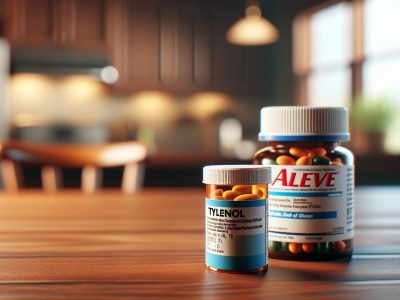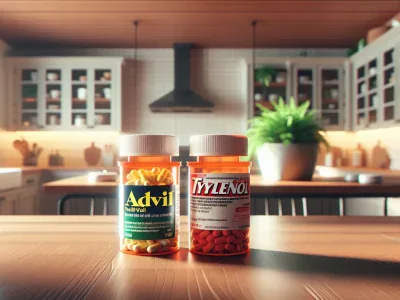Tylenol vs Ibuprofen: Which Pain Reliever Is More Harmful to Your Liver?
When you’re reaching for pain relief your choice between Tylenol (acetaminophen) and Ibuprofen could impact your liver health more than you realize. These common over-the-counter medications work differently in your body and understanding their effects on your liver is crucial for making informed decisions about pain management.
While both medications are generally safe when used as directed they can pose distinct risks to your liver health. Many people don’t realize that these everyday pain relievers process through different pathways in your body with varying effects on your liver function. The key differences between how Tylenol and Ibuprofen interact with your liver could help you make smarter choices for your long-term health.
How Tylenol and Ibuprofen Affect the Liver
Tylenol (acetaminophen) processes directly through the liver, creating metabolites that impact liver function. The liver converts acetaminophen into a toxic compound called NAPQI, which requires glutathione for neutralization.
| Medication | Primary Processing | Risk Level | Safe Daily Limit |
|---|---|---|---|
| Tylenol | Liver metabolism | Higher | 4,000 mg |
| Ibuprofen | Kidney metabolism | Lower | 3,200 mg |
Ibuprofen metabolizes primarily through the kidneys, reducing direct liver strain. The liver plays a secondary role in processing ibuprofen, making it less taxing on liver function compared to Tylenol.
Key differences in liver processing:
- Tylenol depletes glutathione stores during metabolism
- Ibuprofen bypasses major liver pathways
- Tylenol causes direct hepatic cell stress
- Ibuprofen produces minimal liver enzyme elevation
Risk factors that increase liver strain:
- Alcohol consumption within 24 hours of Tylenol use
- Taking multiple acetaminophen-containing products
- Existing liver conditions like hepatitis or cirrhosis
- Fasting or malnutrition during medication use
Signs of liver stress from these medications:
- Yellowing skin or eyes (jaundice)
- Dark urine coloration
- Upper right abdominal pain
- Unusual fatigue or weakness
- Current liver health status
- Medication dosage amounts
- Frequency of medication use
- Concurrent substance intake
Understanding Tylenol’s Impact on Liver Health
Tylenol’s active ingredient acetaminophen processes directly through the liver, creating unique challenges for liver health. The liver converts acetaminophen into metabolites that require specific handling mechanisms within liver cells.
How Acetaminophen Damages the Liver
Acetaminophen triggers a complex metabolic process in the liver through three main pathways:
- Converts to NAPQI, a toxic compound that depletes glutathione stores
- Overwhelms liver detoxification systems at high doses
- Creates oxidative stress leading to cellular damage
The risk of liver damage increases with:
- Alcohol consumption paired with acetaminophen use
- Taking multiple acetaminophen-containing products simultaneously
- Pre-existing liver conditions like hepatitis or cirrhosis
Safe Dosage Limits for Tylenol
| Age Group | Maximum Daily Dose | Single Dose Limit | Minimum Hours Between Doses |
|---|---|---|---|
| Adults | 4,000 mg | 1,000 mg | 6 hours |
| Children 12+ | 3,000 mg | 650 mg | 4-6 hours |
| Children 6-11 | 2,400 mg | 480 mg | 4-6 hours |
Critical dosing guidelines include:
- Never exceeding 4,000 mg in 24 hours
- Spacing doses 6 hours apart minimum
- Checking all medications for acetaminophen content
- Reducing maximum dose to 2,000 mg when consuming alcohol
- Taking medication with food
- Staying hydrated with 8-10 glasses of water daily
- Avoiding alcohol during treatment periods
- Maintaining consistent dosing schedules
Ibuprofen’s Effects on the Liver
Ibuprofen, a non-steroidal anti-inflammatory drug (NSAID), processes differently in the body compared to acetaminophen. This medication primarily metabolizes through the kidneys rather than the liver.
NSAID Processing in the Body
Ibuprofen enters the digestive system where it’s absorbed into the bloodstream. The liver processes only 10% of ibuprofen, while the kidneys handle 90% of the metabolism. During this process, ibuprofen inhibits COX-1 and COX-2 enzymes, reducing inflammation signals throughout the body.
Key processing steps:
- Absorption through stomach lining within 30 minutes
- Distribution via blood plasma proteins
- Metabolization primarily in kidneys
- Excretion through urine within 24 hours
| Processing Stage | Timeframe | Organ Involvement |
|---|---|---|
| Absorption | 30-60 min | Stomach |
| Distribution | 1-2 hours | Bloodstream |
| Metabolism | 4-6 hours | Kidneys (90%) |
| Excretion | 24 hours | Urinary system |
Liver Risks Associated with Ibuprofen
Ibuprofen presents minimal direct liver risks compared to acetaminophen. The liver processes a small percentage of ibuprofen through three pathways:
- Oxidation reactions
- Glucuronidation
- Hydroxylation
Potential liver concerns include:
- Elevated liver enzymes in long-term use
- Rare cases of drug-induced liver injury
- Increased risk with doses exceeding 3,200mg daily
- Interaction effects with alcohol consumption
Research indicates liver damage from ibuprofen occurs in 1-5 cases per 100,000 users, making it significantly less common than acetaminophen-related liver injury. Clinical studies show liver enzyme elevations normalize after discontinuing ibuprofen use.
Comparing Liver Safety Between the Two Medications
Direct research comparisons between Tylenol and Ibuprofen demonstrate distinct liver safety profiles based on their metabolic pathways. Clinical studies from the National Institutes of Health reveal specific patterns of liver impact for each medication.
Short-Term vs Long-Term Effects
Tylenol’s short-term liver effects emerge within 24-48 hours of exceeding recommended doses, while Ibuprofen’s effects typically develop over weeks of regular use.
| Timeframe | Tylenol (Acetaminophen) | Ibuprofen |
|---|---|---|
| Short-term (1-3 days) | Potential acute liver damage at >4,000mg | Minimal liver impact |
| Long-term (>30 days) | Risk of chronic liver stress | Enzyme elevation in 1-5% of users |
| Recovery period | 7-14 days after stopping | 2-4 days after stopping |
Risk Factors and Drug Interactions
Multiple factors increase liver stress when taking these medications:
- Consuming alcohol within 24 hours of Tylenol use multiplies liver toxicity risk by 3x
- Taking multiple acetaminophen-containing products increases overdose potential
- Pre-existing liver conditions reduce safe dosage thresholds by 50%
- Combining either medication with certain antibiotics elevates liver enzyme levels
- Fasting or malnutrition depletes glutathione stores needed for Tylenol metabolism
Common drug interactions affecting liver function:
| Medication | Risky Combinations |
|---|---|
| Tylenol | Alcohol, anticonvulsants, isoniazid |
| Ibuprofen | Diuretics, blood thinners, SSRIs |
Note: Healthcare providers recommend checking all medication labels for acetaminophen content to avoid unintentional overdose through combination products.
- Taking prescription medications that affect liver function
- Experiencing chronic health conditions like diabetes or obesity
- Following restricted diets that limit nutrient intake
- Using herbal supplements that influence liver metabolism
Safe Usage Guidelines and Precautions
Dosing Protocols
- Take Tylenol in 325-500mg doses every 4-6 hours
- Space Ibuprofen doses 4-6 hours apart in 200-400mg amounts
- Track total daily intake using a medication log or phone app
- Check combination medications for hidden acetaminophen content
Risk Reduction Strategies
- Avoid alcohol consumption while taking either medication
- Take medications with food to reduce stomach irritation
- Stay hydrated by drinking 8-10 glasses of water daily
- Wait 24 hours between switching pain relievers
High-Risk Situations
People with these conditions require medical guidance before use:
- Liver disease or hepatitis
- Kidney dysfunction
- Blood clotting disorders
- Pregnancy (especially third trimester)
- History of stomach ulcers
Warning Signs to Monitor
Stop use and seek medical care if experiencing:
- Yellowing skin or eyes
- Dark or tea-colored urine
- Upper right abdominal pain
- Unusual bruising or bleeding
- Severe nausea or vomiting
| Maximum Daily Limits | Adults | Children (6-11) |
|---|---|---|
| Tylenol | 4,000mg | 2,400mg |
| Ibuprofen | 3,200mg | 1,200mg |
Drug Interactions
Common medications requiring dose adjustments:
- Blood thinners
- Antidepressants
- Blood pressure medications
- Diuretics
- Other NSAIDs or pain relievers
Store medications in a cool dry place below 77°F (25°C). Discard expired products according to local guidelines. Contact your healthcare provider for personalized dosing recommendations based on your medical history.
Conclusion
When it comes to liver health Tylenol poses a greater risk than Ibuprofen due to its direct processing through the liver. While both medications are safe when used as directed Tylenol requires more careful monitoring of dosage and timing.
For optimal liver health choose Ibuprofen when appropriate especially if you have existing liver concerns or consume alcohol regularly. Always follow recommended dosages stay within daily limits and pay attention to warning signs of liver stress.
Remember to consult your healthcare provider before starting any pain relief regimen particularly if you have underlying health conditions or take other medications. Your liver’s health is crucial so making informed decisions about pain relievers will help protect this vital organ for years to come.







